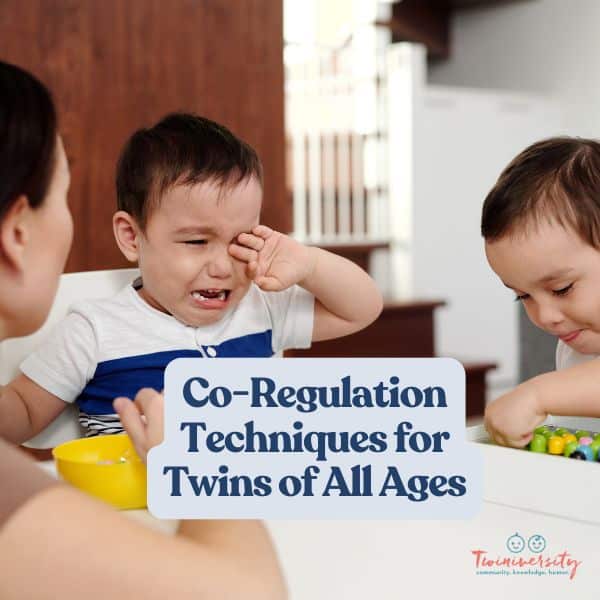Last updated on September 8th, 2023 at 09:38 pm
All content on this website, including medical opinions and any other health-related information, is for informational purposes only and should not be considered to be a specific diagnosis or treatment plan for any individual situation. Use of this site and the information contained herein does not create a doctor-patient relationship. Always seek the direct advice of your own doctor in connection with any questions or issues you may have regarding your own health or the health of others.
Teething is known to be one of the most agonizing times for babies, and parents, especially times two. At around six months, some as early as four, a baby should sprout their first tooth. However, that was not the case for our twins. Six months came and went but no teeth. Then eight, ten, eleven months, and still not a tooth between the two of them. The stress I anticipated having due to teething was not because of, but instead because of the lack of. I started to worry and wonder if our twins were ever going to get any teeth. So what could it mean if you have toothless toddler twins?

What Is Delayed Teething?
Delayed teething is when a baby takes longer than average to get their teeth. While typically babies start getting their first tooth at four to six months, some may take up to 12 months or even longer before they show any signs of teething. While delayed teething is not necessarily considered a medical condition, it can cause concern for parents and caregivers, as it can be a sign of a developmental delay.
What Causes Delayed Teething?
While there is no definitive answer as to why some babies take longer than others to get their teeth, there are several potential causes.
- Gender: In general, girls tend to see their first baby teeth earlier than boys.
- Premies: Premature babies and those with a low birth weight might also get their first baby teeth later than others.
- Genetics: If you or your partner had similar late teething issues at the same age, it could be likely that your babies will experience similar issues.

Check out our Multiple Birth Discounts! This is the most up-to-date list of discounts, freebies, and coupon codes for twins and multiples on the internet. Click here to start saving! While you’re at it, make sure to check out our expecting twins classes and membership programs…
- Vitamin Deficiency: Low levels of calcium and vitamins D, C, B, and A can impact your baby’s teething.
- Fibrosis: Fibrosis is a condition characterized by thick gums that impede or prevent the teeth from erupting. This could cause a delay in teeth eruption.
- Diet and Nutrient Absorption: If your baby is not getting enough breast milk or if the baby formula is not geed enough to provide all the nutrients that your babies need, it could lead to delayed teething.
- Calcium Deficient at birth: One theory is that some babies may be born with less calcium in their bodies, which can lead to a delayed eruption of the teeth.

What Are The Signs of Delayed Teething?
Delayed teething is a common occurrence for many babies and can be concerning for parents. The American Dental Association suggests that the average age for a baby’s first tooth to come in is six months, but some babies may take up to 12 or even 18 months to get their first tooth.
The most common signs of delayed teething are no teeth at six months and no teeth at 12 months. Other signs to look out for are excessive drooling, a lack of interest in solid foods, difficulty sleeping, crankiness or irritability, and increased sensitivity to cold and hot temperatures.
Can I Help My Babies With Delayed Teething?
While there is no definitive way to speed up the process of delayed teething, there are several things that parents can do to help their babies through the process.
- Massage your baby’s gums: Gently massage your baby’s gums with a clean finger or wet gauze to help encourage new teeth to come in.
- Keep their mouths clean: Use a soft toothbrush or washcloth to clean your baby’s gums and tongue.
- Offer cold foods: Cold foods can help soothe your baby’s gums and reduce inflammation caused by teething.
- Teething toys: Teething toys provide a safe way for babies to chew on something that may help alleviate the pain that comes with teething.
- Give them ibuprofen or acetaminophen: If your baby is in a lot of pain, you can give them ibuprofen or acetaminophen to help relieve the discomfort. Always speak to your doctor before giving any medicines to your baby.

- Make sure they are getting enough nutrients: Proper nutrition and vitamins are essential for helping babies get the proper minerals and vitamins that help with teething. Talk to your pediatrician about the best diet for your baby.
Are there Long-Term Effects of Delayed Teething?
While delayed teething is not usually cause for concern, it can still have long-term effects on your babies’ teeth. Delayed teething may lead to malocclusion (when the teeth do not align properly). Malocclusion can cause overcrowding and misalignment of the teeth when they do start to come in. Delayed teething can lead to a delay as well as difficulty speaking, and eating. The entire mouth is essential for speech, including your teeth. Any problem with your child’s teeth or oral development can affect their speech.
If you have any concerns regarding your baby’s teething process, it is best to speak with your pediatrician as soon as possible.

Stressing out with your infant twins? Let us help! Learn what to expect in the first year with twins, including tips, tricks, and advice from real twin parents who have been there. Click here to learn more… and while you’re at it, check out our twin parent coaching services and Twiniversity shop!
6 Myths about Delayed Teething
Science has moved ahead in leaps and bounds with improvements in baby care and a better understanding of how the growth and development of a child take place. However, there still remain various superstitions that cause concern or even excitement. The imagination and variety of myths about baby teething can be entertaining. However, these should not be taken seriously!
1. It Brings Good Luck
There are some theories that state a child whose first tooth comes in after seven months old is bound to have good fortune all their life. Another myth mentions that they will bring riches to their family. Makes me wonder if the Olsen twins were late teethers.
2. Sign of Intelligence
Another folklore states that late teething is a sign of brilliance. However, there are plenty of other superstitions that reference early teethers, or babies born with teeth, are the smart ones. Whether an early teether or late teether, there is no proven correlation between the time a child’s first tooth sprouts and intelligence.
3. They will Care for Their Parents
A Chinese superstition reads, “the child which cuts its teeth comparatively late will support its parents in their old age.” Even if this has no evidence of truth, I find this legend to be genuinely wishful.
4. Teething will be Hard
According to Kentucky Superstitions, it is believed that if a baby looks in a mirror before it has teeth, teething will be difficult for the child. Some interpret this myth as late teething will bring bad luck. I think most parents would agree that teething is a difficult time, no matter when their teeth come in.

5. They will be Thieves
Kentucky Superstitions claim that late teething will make your child a thief. This one has some room for interpretation, especially since its 1800’s origin. Also, there is no scientific connection between sticky fingers and gummy grins.
6. Tallness
This was one that my pediatrician said to me. A delay in teething could mean an osteo delay meaning their bones will grow later. I’m 5’3 so only time will tell on that one!
7. Siblings
The Little Giant Encyclopedia of Superstitions says that the number of teeth a baby has on their first birthday indicates how many siblings they will have. Ironically, just days before our twins turned one each had one tooth pop up.
Believe what you want, but remember delayed teething is usually due to genetics or simply being a late bloomer. Teeth development happens at the same time in utero for all pregnancies, but tooth eruption is unique to each child. Yes, even identical twins can sprout teeth at different ages.
Teething Products
When teething finally starts to bite check out these products.
Nuby Soothing Teething Mitten

The soft, flexible mitten is a great solution for teething babies. Their hands are going to go in their mouth anyway, so give them this soft silicone mitten that provides stimulation to gums and relief to emerging teeth.
Click Here to purchase
Brilliant Baby’s 1st Toothbrush

Our go-to relief was Brilliant Baby’s 1st Toothbrush Teethers. It comes as a two-pack, which is essential for twin goods. It is dishwasher safe and can easily be thrown in the diaper bag. Tip: leave it in the freezer before use. These baby toothbrushes double as teethers and also helped to get our twins used to brushing their teeth – when they finally get teeth.
Purchase here
Munchkin Fresh Food Feeder

Loss of appetite due to painful gums was one of the teething symptoms my twins went through. By the time my twins were getting teeth, they had already explored all the different fruits and vegetables so we did not have the fear of allergies (yes there are some benefits to late teething). Filling these with their favorite fruits made them a double win for our twins.
Click here to purchase
For a complete list of Twiniversity Top Teething Products, click here.

For some, seemingly odd reason, I always thought my twins would be popping their pearly whites early. I was so convinced of it that I had even added them to our dental insurance when the twins were three months old – yes, a little overzealous in retrospect. Needless to say, our two-year-olds are still without a full set and each currently has a different amount of chompers. I can only hope that all our stress of teething will be worth our later years when they will be taking care of us.
The Children’s Dental Center recommends seeing a pediatric dentist if your child does not have any teeth by eighteen months. Do not stress out! While late teething is on the rare side, if your twins are thriving and happy, then there is no reason to panic. The average age is six months, but it is not abnormal if either or both twins are all gums, even well after their first birthday.










